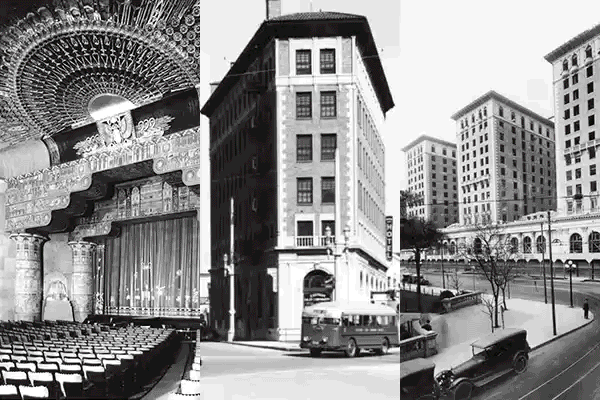Page From Rock ‘n’ Roll History Falls Prey to Wrecking Crews
If there’s a dimly lit corner of rock ‘n’ roll heaven zoned for cheap motels, the faded palms of West Hollywood’s late Tropicana will be found somewhere within staggering distance.
When the wrecking crews moved in last week to make way for a 178-unit Ramada Inn, they buried a piece of pop history in the tangle of crumbled stucco and broken lath that marks the spot at 8585 Santa Monica Blvd. where the Tropicana Motel once slouched.
“I think it’s a shame. I think they should have gone and got it made a historic landmark, or something, ‘cause it was,” said Richard Miller, 52, the no-nonsense maitre d’hotel at Duke’s Coffee Shop, which for years served as the Tropicana’s resident eatery. Forced out by the scheduled demolition, Duke’s moved to new quarters on the Sunset Strip late last year.
“It was a funky place, no doubt about that,” said Jerry Heiner, 59, who headed a partnership that owned the motel during much of the 1970s and early ‘80s, the years when the Tropicana--and Duke’s--became meccas for rock musicians and the occasional movie star.
Gravel-voiced singer Tom Waits, once described as “minstrel-in-chief of America’s urban underbelly,” resided at the Tropicana for about three years, Heiner recalled. Somewhere in the rubble is a door frame that Waits once “enlarged”--without authorization--to accommodate a piano he wanted to move into his quarters.
William S. Burroughs, the cult figure and beat author who wrote “Naked Lunch,” occasionally was spotted at pool-side. Singer-songwriter Rickie Lee Jones is said to have spent more than one night curled up in a Tropicana lawn chair.
“Somehow, over the years, the whole mystique was perpetuated,” said Sylvia Eck, 36, who managed the motel for Heiner. “Every time you turn around, somebody is trying to tell you a story about who stayed there.”
The rich and famous were hardly the mainstay of the Tropicana’s trade. More than a few drug dealers and prostitutes, male and female, tried with varying degrees of success to make the motel their headquarters.
Rock Bands
But the most enthusiastic clients were the working rock bands that found the Tropicana inexpensive ($29.75 a night if guests stayed the week), close to the West Hollywood clubs and possessed of a benign seaminess that was close to their hearts.
Greetings from some of the groups that passed through are enshrined on the walls at Duke’s new home, just west of the Whiskey a Go Go. Among the contributors are the Volumatix, the Gun Club, Maurice and the Cliches, and of course Judy Nylon.
“It was just so crazy around there,” recalled Doug James, 34, whose Rhode Island band, Roomful of Blues, stayed at the Tropicana.
“One time, our drummer locked himself out of his room, so he went around back and climbed into the bathroom of what he thought was his room,” James recounted. Because of the confusing layout, or perhaps an altered state of consciousness, it turned out that the drummer was mistaken.
“Some chick was in there taking a shower, and he just said, “Scuse me, wrong room,’ and walked out.”
Other Experiences
Most of the incidents recalled by those who frequented the premises are less printable.
Despite the weirdness, the lowlifes and the high-lifes who rubbed elbows at the motel and the coffee shop seemed to get on remarkably well. “That’s one thing about it. I can take any name person and shove his butt right next to some guy with green hair, and he’s very happy,” said Miller of Duke’s.
The progress that has wiped out much of down-scale West Hollywood in recent years in favor of high-rises and fancy hotels caught up with the Tropicana about three years ago when the property was purchased by a partnership headed by developer Yehuda Naftali, 43. The motel finally closed in late September after Naftali won permission from West Hollywood to construct a $20-million complex of motel rooms and retail shops.
Henie Burke, who owns Duke’s with her husband, Stan, admits to a sense of loss.
“People are very nostalgic about places and things, and they didn’t want us to move. But we had no choice,” she said. With the demise of the Tropicana, she said, many bands will no longer be able to find affordable lodgings near the venues they work. “Why continue progress?” Burke asked. “Let’s keep some of our roots.”
State of Decay
Said Naftali: “I’m very sympathetic to the history of this place. I’m also sympathetic to the ambiance. The problem was the place was absolutely falling apart and it was impossible to keep in its present condition.”
Despite claims by some that the Tropicana is 60 or 70 years old, the earliest building permit for the site is dated July, 1946. It lists the value of the two-story, 59-unit motel to be constructed as $95,000.
Naftali said he wants to retain some of the charm of the old place. But he acknowledged that his new Ramada Inn won’t be quite the same.
Among the casualties will be “the idea that you can walk in and break things, the way they used to . . . he explained. “They used to throw the parties and get drunk and stoned and whatever. They won’t be able to do it anymore.”
More to Read
Sign up for The Wild
We’ll help you find the best places to hike, bike and run, as well as the perfect silent spots for meditation and yoga.
You may occasionally receive promotional content from the Los Angeles Times.






